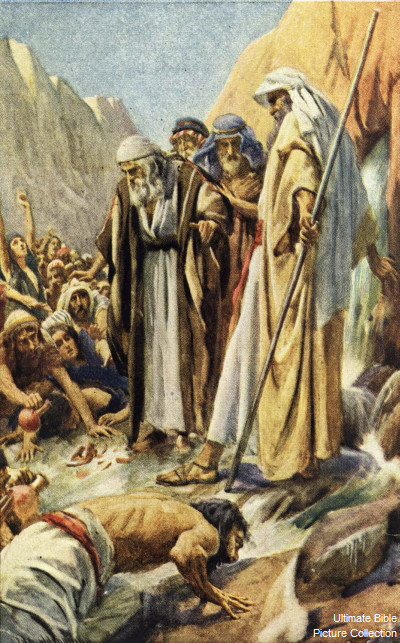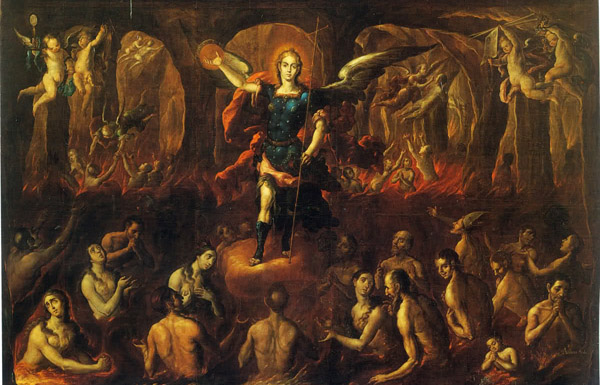As I sit in a little room surrounded by boxes packed and half-packed, putting things back into storage I so happily took out and rediscovered a mere few weeks ago, I am reminded that I am still in the night of the soul. This process is extremely painful for me. It is not that the things represent me, but that the lack of permanency brings purgatory onto this patch of earth.
This night may be years as a journey, as I am not as generous or intelligent as St. John of the Cross, who seems to have gone through both the dark night of the senses and the dark night of the spirit in about nine months.
Some saints take longer to make this climb to illumination than others, which is my hope. My hope is in the Lord, Who went before me into darkness, the darkness of death in His Passion. This night of the soul is no different than that Passion, except in the smallness of my heart and soul, I cannot become another Christ, without His great help.
In the night of the senses, all joy in physical human things and persons eludes one. In the night of the senses, one is in purgatory on earth. Unless God helps one become another Christ, one remains mediocre. Unless one yields to the pain of purgation, one does not enter heaven or perceive Christ's great love.
But, what I am really experiencing is Christ suffering in and through me and His Sacrifice purifies me as He joins His suffering with me. I have to let Him suffer in and through me. This is my salvation.
No one can compare one's sufferings with another's, Suffering is not quantifiable
. One can only rejoice in one's own weaknesses and insignificance, as St. Therese of Lisieux wrote. To become nothing is to let Christ become all, and then, and only then, does the Christian become Christ in the world,
Christianus alter Christus.
These boxes remind me of failures, itineracy, the lack of stable prayer times, the lack of family and even permanent communal support necessary to live in the heart of any community. Always, I end up like a ship passing through, (yes, with many friends waving on the shore), but only to leave again, not even knowing to where the tide will take me.
The night of the senses has left me with practically nothing on which to rely, which is the whole point of this dark night. The night of the spirit leads to a more ruthless purging of even gifts, which are not allowed to be used, or deep loves, which cannot be expressed. The only thing left is the longing for Christ, as the bride seeks the Bridegroom until He is willing to be found.
Distant are the moments of love and trust, as I sit surrounded by boxes of books, clothes, and papers The chapel has been taken down weeks ago, and the remnants of it put away, with only one large icon and one statue left on, yes, a box, and a dresser.
But, God is Creativity. When St. Benedict Labre was not allowed to join a community, he created, with the Holy Spirit, his own way to God, pilgrimaging throughout Europe, until he got to Rome and collapsed, dying at the young age of 35. He is a patron of the homeless, beggars, and the mentally ill. He is a one-of-a-kind saint. I do not believe he was mentally ill, but found joy in the humility of being misunderstood by those who did not and still, do not, understand the fool for Christ. A great sign of humility is the ability to rejoice in being misunderstood.
Those who want to follow Christ do so in many different ways, and, it is not one's own way, but God's way.
What the world needs is known to God, not to us. We can imagine, in the narcissism of our gifts and talents what we think the world needs, but God has other ideas. God fashions us to be saints according to His ideal, not one's own.
Three people experienced this dark night of the spirit in Scripture, and we have their words.
The most obvious is Job, who lost everything in the dark night of the senses, and then was misunderstood and falsely reprimanded by friends in his dark night of the spirit, when God seemed far away, indeed. Job had to come to complete trust in God, complete surrender, and God dealt with those who tried to put Job into their own boxes of what holiness should look like.
Job 42 Douay-Rheims
42 Then Job answered the Lord, and said:
2 I know that thou canst do all things, and no thought is hid from thee.
3 Who is this that hideth counsel without knowledge? Therefore I have spoken unwisely, and things that above measure exceeded my knowledge.
4 Hear, and I will speak: I will ask thee, and do thou tell me.
5 With the hearing of the ear, I have heard thee, but now my eye seeth thee.
6 Therefore I reprehend myself, and do penance in dust and ashes.
The second person who one sees in the dark night of the spirit is the bride in the
Song of Songs.
Song of Solomon 3 Douay-Rheims
3 In my bed by night I sought him whom my soul loveth: I sought him, and found him not.
2 I will rise, and will go about the city: in the streets and the broad ways I will seek him whom my soul loveth: I sought him, and I found him not.
3 The watchmen who keep the city, found me: Have you seen him, whom my soul loveth?
She had experienced love, but lost the first flames of consolation. Therefore, she must look for Love, Who hides from her until she is ready to find Him. She must seek the Beloved until He lets her find out where He really is.
The third person one can identify as in the dark night of the spirit is St. Paul. His conversion brought him into the dark night of the senses, literally, as he was temporarily blinded for three days, in keeping with Christ's three days in the tomb. But, after his cure, Paul went into the desert, to Mt. Sinai, for as long as ten years, and later wrote this in Galatians 4:
22 For it is written that Abraham had two sons: the one by a bondwoman, and the other by a free woman.
23 But he who was of the bondwoman, was born according to the flesh: but he of the free woman, was by promise.
24 Which things are said by an allegory. For these are the two testaments. The one from mount Sinai, engendering unto bondage; which is Agar:
25 For Sina is a mountain in Arabia, which hath affinity to that Jerusalem which now is, and is in bondage with her children.
26 But that Jerusalem, which is above, is free: which is our mother.
27 For it is written: Rejoice, thou barren, that bearest not: break forth and cry, thou that travailest not: for many are the children of the desolate, more than of her that hath a husband.
28 Now we, brethren, as Isaac was, are the children of promise.
29 But as then he, that was born according to the flesh, persecuted him that was after the spirit; so also it is now.
30 But what saith the scripture? Cast out the bondwoman and her son; for the son of the bondwoman shall not be heir with the son of the free woman.
31 So then, brethren, we are not the children of the bondwoman, but of the free: by the freedom wherewith Christ has made us free.
Now, Hagar represents the flesh, Sarah's bad will, and Ishmael the child of the flesh, while Sarah represents the spirit, when she trusted God, and Isaac the child of the spirit. St. Paul went into Arabia, to Mt. Sinai, the place of Moses' reception of the Law. This was no accident.
There, St. Paul learned, through the long purification of his soul, the difference between living by the Law and living in the Spirit. This is exactly what he preached with such clarity, and he learned it the hard way, as so many of us do, by enduring purgation of sin, and the destruction of the predominant fault. Then, God allowed Himself to be found. In this finding, Paul experienced great freedom. He is the theologian of this freedom. Isaac represents the covenant of love, and the New Jerusalem, not the old, which was destroyed in 70 A.D., --the old represents the lack of covenant love. St. Paul in the desert moved from this purgation of his soul to illumination, about which he wrote later. This is a true description of a man who has moved out of purgation, out of both dark nights, into the illumination state, and then union.
2 Corinthians 12 Douay-Rheims
12 If I must glory (it is not expedient indeed), but I will come to visions and revelations of the Lord.
2 I know a man in Christ above fourteen years ago (whether in the body, I know not, or out of the body, I know not; God knoweth), such a one caught up to the third heaven.
3 And I know such a man (whether in the body, or out of the body, I know not: God knoweth),
4 That he was caught up into paradise, and heard secret words, which it is not granted to man to utter.
5 For such an one I will glory; but for myself I will glory nothing, but in my infirmities.
6 For though I should have a mind to glory, I shall not be foolish; for I will say the truth. But I forbear, lest any man should think of me above that which he seeth in me, or any thing he heareth from me.
7 And lest the greatness of the revelations should exalt me, there was given me a sting of my flesh, an angel of Satan, to buffet me.
8 For which thing thrice I besought the Lord, that it might depart from me.
9 And he said to me: My grace is sufficient for thee; for power is made perfect in infirmity. Gladly therefore will I glory in my infirmities, that the power of Christ may dwell in me.
10 For which cause I please myself in my infirmities, in reproaches, in necessities, in persecutions, in distresses, for Christ. For when I am weak, then am I powerful.
11 I am become foolish: you have compelled me. For I ought to have been commended by you: for I have no way come short of them that are above measure apostles, although I be nothing.
12 Yet the signs of my apostleship have been wrought on you, in all patience, in signs, and wonders, and mighty deeds.
And, yet, God allowed him to suffer something which was painful. What form this infirmity took does not matter, But, like the limp of Jacob, this physical suffering remained a sign of St. Paul's encounter with God. One is wounded when one encounters God, never to be the same again. When one wrestles with God for the blessing of illumination and union, one is wounded. One must be.
That St. Paul's night of the spirit may have lasted ten years gives me hope, for he is a great saint, and I shall be content with being a little saint. However, what St. Benedict Labre knew, and what St. Paul knew, and what Job learned, and what the bride learned is that some of us cannot be anything but extreme-either extremely good or extremely bad. God took them to the edge, and there, they found Him.
Such is the lesson I learn in my box-room. God literally boxes me in so that I have to face my own sin and imperfections in order to make my small heart larger so that He can reside there comfortably. This box-room is on the edge of new life, like a dry oasis, a mirage, of something greater to come.
This little prison of transience, shows me again and again, that this world passes, is temporary, but that God's life is eternal.
I knew as a young person that I loved the things of this world too dearly-nature, music, people, animals, even God's own presence in the things He created. I walked in love. I always experienced things deeply. People noticed this. I loved love. To be weaned from such a love of creation, which is overwhelming, and the love which comes from the sensitivities of a thinker, a writer, a poet and a painter, I have had to be draw into the ugliness of nothingness in order to see the God Within. My God is the God of the Passion, the God of the desert.
He is here, among the boxes and detritus of my life, waiting, while He takes me through this stage of the dark night.
Father Ripperger reminds us all in his talks that few people realize that they are far from true holiness. Today, as I move into a smaller and smaller place to walk and even write, I am aware of this need to be violently honest with the self in order to move on. The walk is not over, but I am on the way...
The one persistent myth which has spoken to me has been that of Psyche, who had Love, the god of love, and lost him through disobedience and a lack of trust, only to have to endure the punishments and trials of Aphrodite, who was jealous of her, but also to prove Love that she, Psyche, could love. Because of her journey and persistence to find love, Psyche was allowed to become a goddess herself. Psyche means soul, and this tale is very much like the journey of the dark night of the spirit, where impossible trials are overcome with both grace and determination, in an atmosphere of the complete lack of consolation. One keeps walking. One does not give up seeking Love.
The immortal soul must find love and live in love. Love has a name, Jesus Christ. But, one must suffer.
This is my hope..that Christ allows me to suffer in and with Him, and in this suffering, I shall find Him, as He is here among the boxes.










